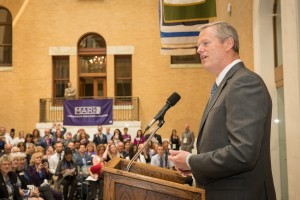
Gov. Charlie Baker gives the keynote speech at the 2018 Margaret C. Carlson Realtor Day on Beacon Hill.
Again trying to tap the brakes on attempts to raise taxes to fund transportation improvements, Gov. Charlie Baker over the weekend called on Beacon Hill to address his housing production bill, saying housing costs are causing frustrated commuters to weigh moving out of Massachusetts.
“Part of the issue we face is driven by the success we’ve had economically,” the governor told “On the Record” hosts Ed Harding and Janet Wu of WCVB in an interview that aired Sunday morning. “We have more people working than at any time in state history which means we have more people going to and from work.”
Economists reported Friday that the state economy grew at a 4.6 percent annual rate in the first quarter, and housing analysts reported separately last week that home sale prices in Massachusetts spiked to a record high for the month of March, with the median sale price rising 6.2 percent to $377,000. An inadequate supply of affordable rental properties was also flagged as an ongoing problem in two reports released this year.
After Wu mentioned “ridiculous long commutes” in Massachusetts and Harding said people may move out of the area due to unsustainable commutes, Baker pivoted to a lack of housing stock that he said is driving up prices.
“Part of the issue there has to do with our housing problem,” Baker said. “Remember, we haven’t produced the same number of new starts in housing for the past 30 years that we used to produce every year.”
Baker has proposed legislation to boost housing production and his team has promoted that bill at recent stops in Salem, Lawrence, Hyannis, Hadley and Easthampton. Legislative leaders agree that housing affordability is a problem, but Democrats lack consensus on how to address what some describe as a full-blown crisis.
“People have to live very far away to get to work or school or wherever they’re going. We need to deal with this housing issue,” Baker said. “Housing is part of solving the transportation issue.”
At $8 billion, or “maybe more,” Baker said projected state capital spending on the MBTA over the next five years is “more than twice what we’ve ever spent in any five-year period” and “will make a big difference.” A similar amount, he said, will be spent on roads and bridges over the next five years.
“We have a lot of resources that we can bring to bear to deal with these issue and many of them are going to address a lot of the stuff people say we need invest in and we can do it with existing resources,” Baker said. “I don’t know why we would talk about raising taxes if we’re going to be spending at a level that I believe gets us about as far as we can go without completely disrupting anybody’s ability to get anywhere.”
Last week, Baker also drew a line on taxes. “I don’t believe that raising taxes is the answer to this problem at this point in time,” he said.
A MassINC Polling Group survey released last week showed 80 percent of those polled support raising new money to invest in the transportation system.
“I actually remember that survey not saying specifically at all what people would pay more for,” Baker said.
House Speaker Robert DeLeo and Senate President Karen Spilka, who oversee Democratic super-majorities in both branches, have signaled an openness to considering new taxes and revenues, but Democrats on Beacon Hill appear to be lacking momentum on any specific revenue proposals.








